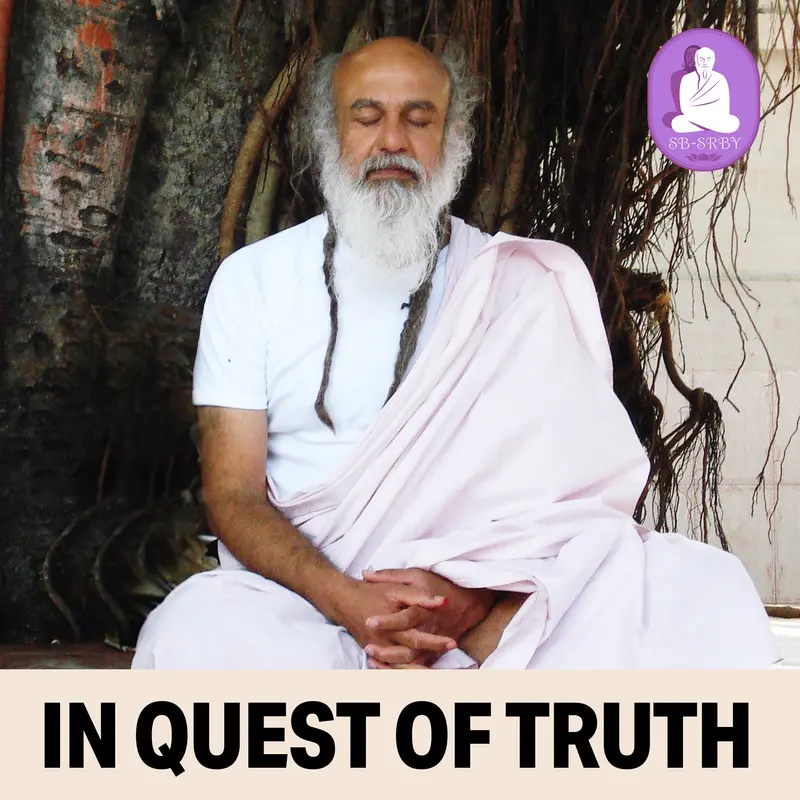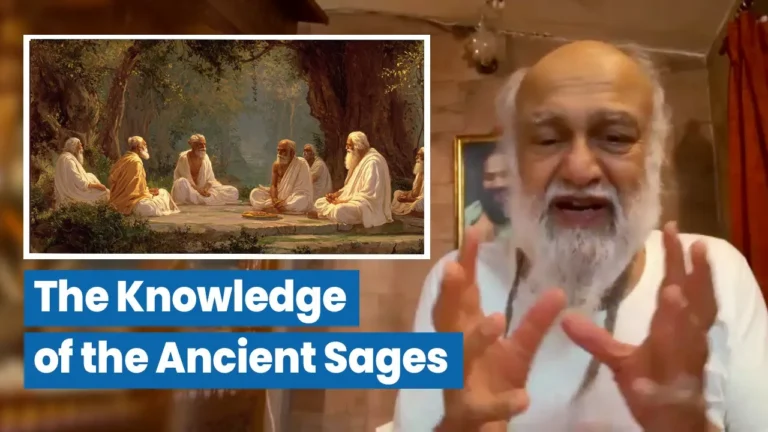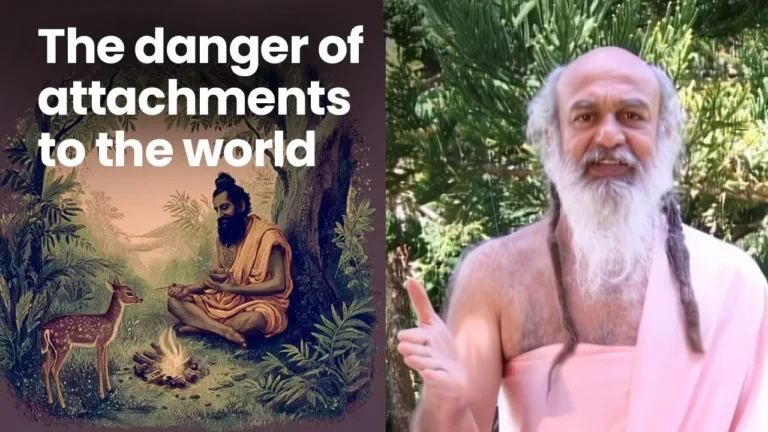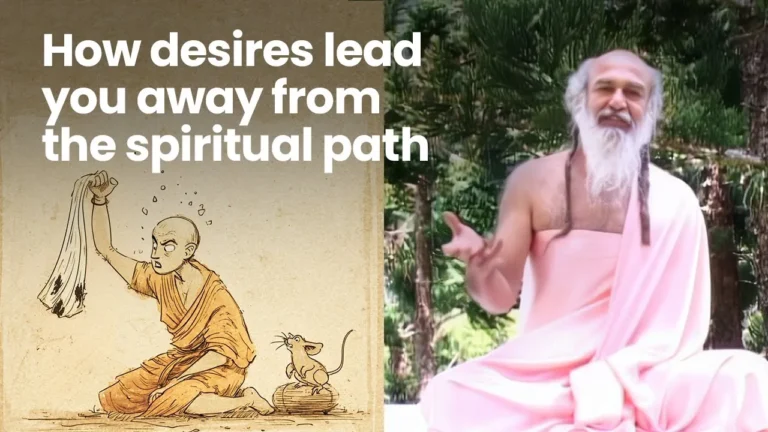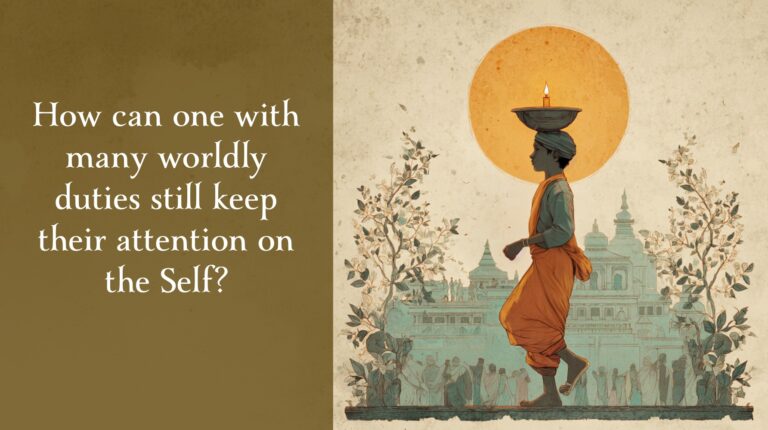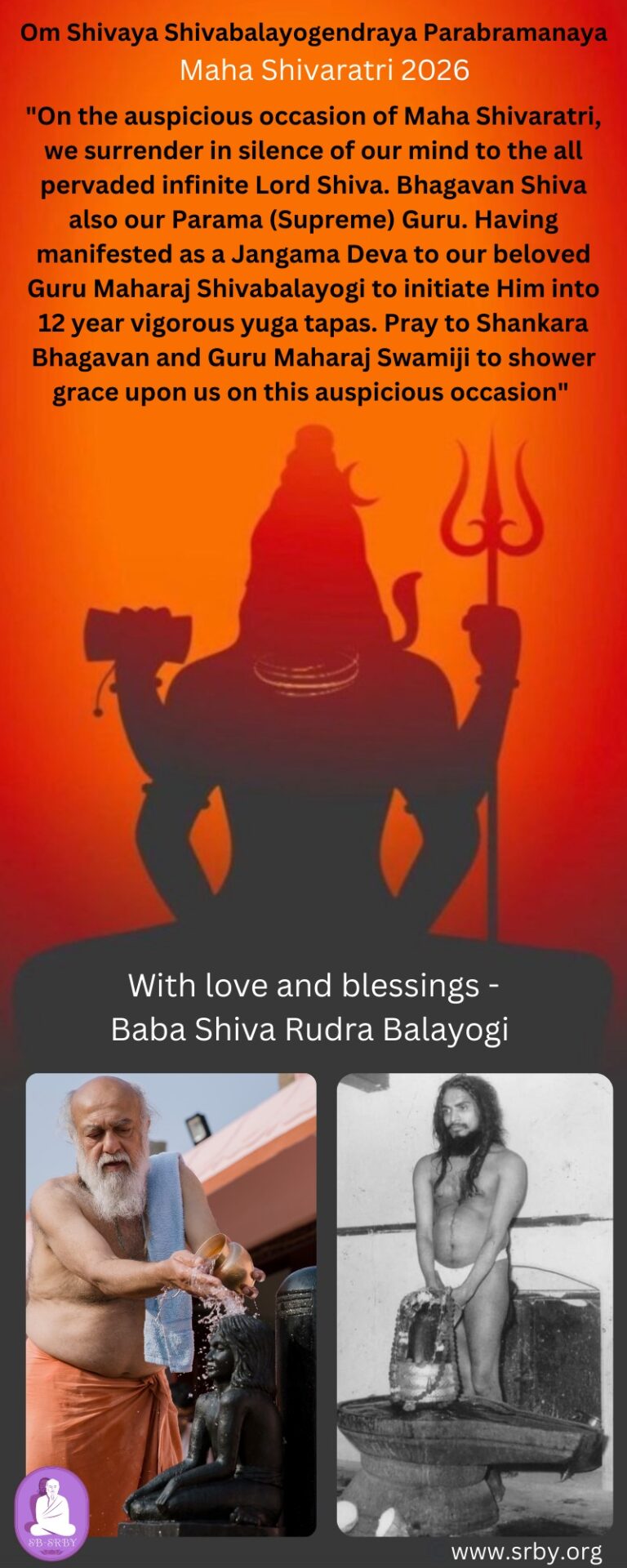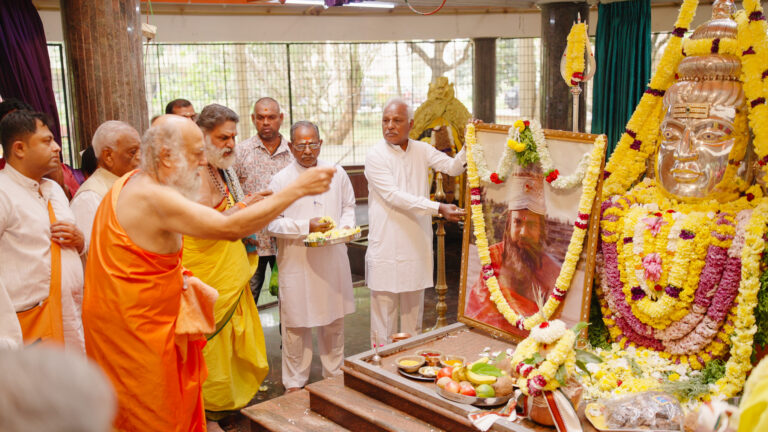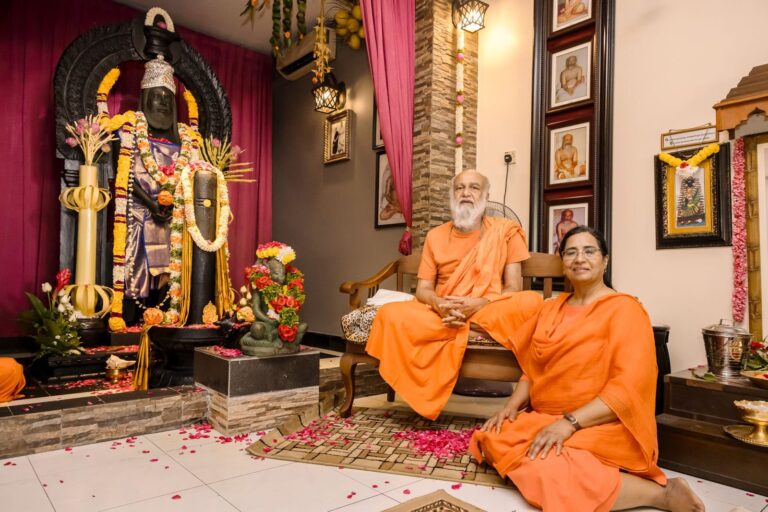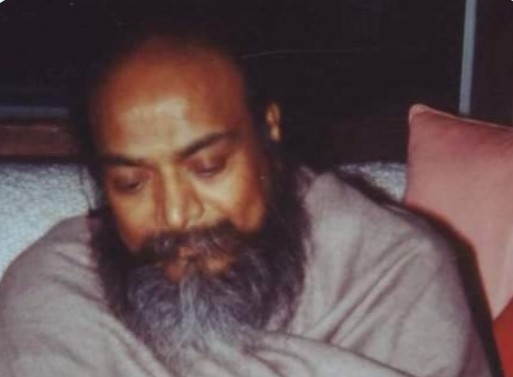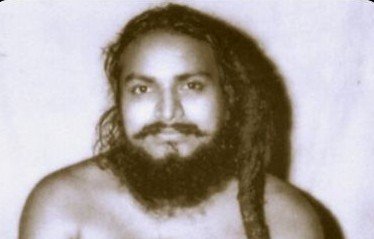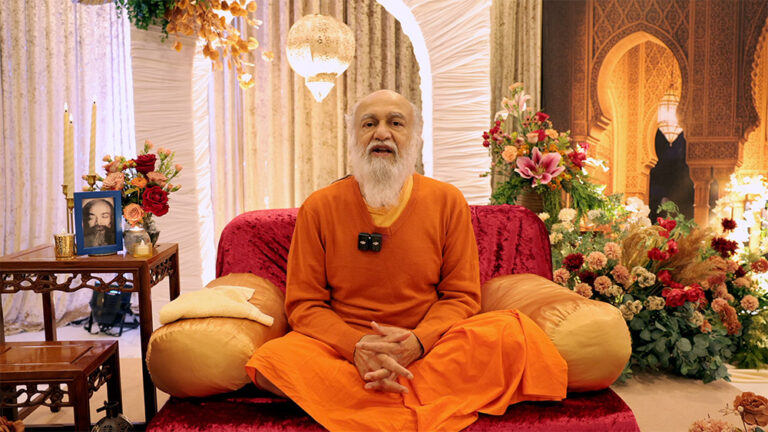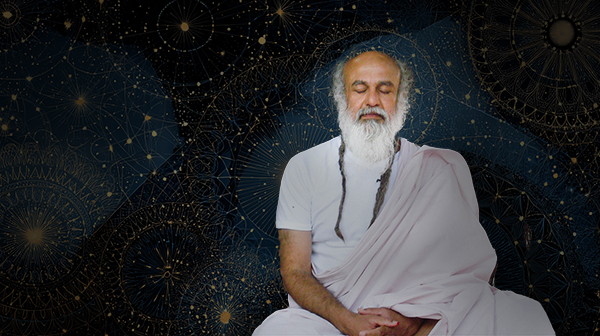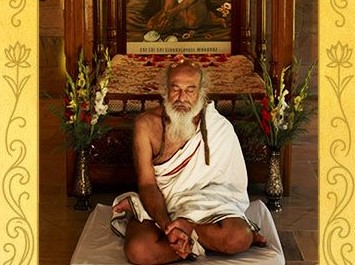A series of Q&As filmed at the Shivabalayogi Devarayasamudram Ashram in South India during a meditation retreat with Shri Babaji over the course of 10 days.
0:00 Intro
0:11 Why do they say that the name (i.e. of Rama) is the same as god?
11:22 How do the vibrations from the Divine benefit the devotee according to their faith if the vibrations don’t have any resolution attached to it?
13:33 Did Rama take a resolution to cut the head of the king?
14:22 So when Rama went to cut the head of the king, his mind was completely silent?
16:53 In the Guru Disciple relationship is it a necessary component to for the disciple to receive scoldings from the Guru?
26:17 Is it because of our prarabdha karma that the mind doesn’t become quiet?
29:42 Could Babaji tell the story of how Valmiki went through a transformation and ultimately wrote the Ramayana?
33:53 In the lifetime of Kaikeyi why did the wrong things she did against Rama not get carried forward to her next birth?
35:19 Is Yoga Nidra indicative of a laziness in the mind, a tamasic nature?
37:46 Is it like achieving Nirvana?
40:23 I meet many western Buddhists who don’t like Hinduism and think it is inferior. What can I say to them?
45:08 Ramana Maharshi talked of dissolving the personal ‘I’ so that we merge with the infinite. Is it the personal ‘I’ only that makes us think ‘this is my body, my house, my relations’ etc?
46:46 The personal ‘I’ is unaware it has imagined Itself as an ‘I ‘inside the Self?
47:07 If the personal ‘I’ is not real then all actions are happening automatically?
47:23 So Babaji is it also true that whatever you do has been destined and you are not in control of the situation?
48:11 I feel like the ‘I’ is very connected to the body, that it is very hard to detach from it.
48:54 So the brain’s refections keep going after Tapas, but a Yogi is not involved in them?
49:52 What is the difference between before Tapas and after Tapas in terms of the brain’s reflections?
51:08 In the story you told of Rama battling against Hanuman using Rama’s name , did it happen according to Hanuman’s prarabdha karma?
52:17 Is Lord Rama still under the influence of prarabdha karma?
53:11 If Rama was the Divine, was it still right on his part to leave his wife Sita in that way?
54:29 Was it Rama’s prarabdha to send Sita to the forest?
Discourse: In Quest of Truth – DSM Meditation Retreat 2024
Day 3 Morning Q&A
Recorded: February 2024
Start of Questions and Answers
____________________________________________________
Question: Why do they say that the name (i.e. of Rama) is the same as God?
Babaji Maharaj: You see, here, you and God, and you take God’s name. What matters is your faith, that is the thing; in the name of the Lord that can work wonders. Because God is in total stillness, mahasamadhi, that it is known as, who is all pervaded simply, is not into any type of resolution, doesn’t think anything. God has no such discrimination, that “Because he is praying, let my blessings go to him only. He is offering me five hundred dollars, let my blessings go to him.” There are no such resolutions with God. Whoever has got faith, they are able to receive the vibrations, the grace of the Divinity. The grace and the vibrations are flowing in all directions. That’s what even all sages like Ramakrishna, our own Swamiji have told, “You have to raise the sail; the wind is blowing. And like Ganga water is flowing, you have to raise a dam. That dam is your faith, and your consciousness becomes the catchment area.” That is why the name of Divinity is recommended. God is recommended always.
Many times those who are familiar with my talks and answers would have heard Rama’s and Hanuman’s battle. That is the story that Swamiji would have told me hundreds of times, because He wanted to make that point penetrate into the inner layers of my mind. Many times. Like, often it could be like, He would have scolded me for forty-five minutes or something, terribly harsh, you cannot imagine, it’s beyond your imagination. Then, He would tell now, “Now that I have scolded you so much, you must be thinking, “I must run away from this old man. Enough of Swamiji, I am not going to stay here. But see, Sri Rama wanted to murder Hanuman.” That was a peculiar language of Swamiji. He had no discrimination of terminologies when and where to use. He simply used to use like that one. “Sri Rama wanted to murder Hanuman, but Hanuman never gave up Rama’s name.” The situation He would explain. Once all the angels, sages, they were all in a conference. They were discussing – the matter that was being discussed was “Which is more powerful? Is Rama Himself more powerful with His bows and arrows, through which He killed the demon Ravana, or is His name more powerful, that even Rama cannot harm?” Then, Vishwamitra says, “I have seen Rama since His childhood, He is more powerful with His bows and arrows. Nobody can challenge Him in all the worlds.” But then, Vasishta says, “No, venerable sage, you are wrong. The one who has total faith in the name of Rama, even Rama’s bows and arrows, His power, nothing can harm him.” Then, they are annoyed; Vishwamitra is totally annoyed. “Now, let us test this; how can you say this one?”
So, they select a particular king who was under the empire of Sri Rama, but he was a great devotee of Rama. All the time he used to meditate on Rama’s name, “Rama, Rama” in his altar also. So, Vishwamitra chooses a certain time when the king was meditating on Rama’s name, and deliberately at the time He enters the palace. Means, tradition in India was that, even if a Guru came to your place unannounced, you are supposed to receive Him with due honors, make Him sit on a proper seat, and wash His feet, that which we call the pada puja, all is done and inquire about welfare and what He needs. You offer everything that you can offer to the Guru. That was the tradition. But here, the king was in meditation with Rama’s name. Taking that as an excuse, deliberately Vishwamitra gets totally annoyed and comes to Rama’s court, durbar, what you call. There, He says, “O, Rama, in your empire, there are certain kings who do not respect us, so there is no business for me to keep my monastery in your empire. I will shift my monastery to some other place. I am not going to be here anymore. I am very annoyed.” Then Sri Rama comes down the throne, taking His pranaams to His feet. See, all these things are here. Even the Divine incarnation also showed how revered the Guru is, the Guru’s feet is, how important the Guru’s place is.
So thus He says, “Please do not move Your monastery to any other kingdom or any other empire. I promise in the name of the bows and arrows through which I killed the demon Ravana who was so powerful, that tomorrow before sunset I will cut the head of that person who has been disrespectful to You.” Then Vishwamitra is now very much pleased. Because, once Sri Rama uttered a word, it is in their genes that “Even if I have to give up my life, but my words will not go wrong.” That type of vow they used to do. Satisfied, He goes, “Now, let us see who can protect him. Tomorrow, Sri Rama is going to cut the head of that king.” He tells “Such and such king was disrespectful, You would have to cut.” He [Sri Rama] says, “Okay, no problem. I will do that one.” Here, Sage Narada who was also in that conference comes to the king, who was meditating on Rama’s name. “Hey King, what is the use you meditate on Rama, Rama, all that time? The same Rama is going to cut your head man, tomorrow before sunset.” Just trying to use Swamiji’s language. He is to talk in a funny language, very beautiful and enchanting all the time.
“So, aah, Bhagavan, what to do now, what will I do?” “Hey, look, I give one idea. If at all somebody can protect you, it is Hanuman. Quietly, look for Hanuman. He is either on a tree top, on the mountain top, all the time in samadhi, “Rama, Rama, Rama, Rama”. Surrender to Him first. Then take promise. Because Hanuman is very fond of Rama devotees. He knows you are a devotee. You tell that you are a devotee of Rama, you are going to be killed next day before sunset, you need His protection. So, because He is in samadhi, means it is like an intoxication, without verifying He will promise; first take promise. Then only tell who it is, who is going to kill you.” Telling that He goes, Narada. Then, “Don’t tell that I taught you to do like this also. Otherwise, Hanumanji will be annoyed with me.” So, the king comes to Hanuman who was into samadhi, surrenders and prays for protection. “O, my Lord, tomorrow, my head is going to be cut. Please, You have to protect me. I have nobody else.” He [Lord Hanuman] says, “In the name of Rama, His name which is so dear to me, I promise that no power can cut your head tomorrow. Don’t worry. I am with you. So, now, tell me who is going to cut your head?” He says, “Your Lord Rama is going to cut my head.” “Ah badmash [rascal], you are such a dangerous man. You are making me to fight with my Guru now. What to do?” Then He (Lord Hanuman) thinks, “It is some Divine play. Let us be quiet.” So, then He builds a fort out of His tail, makes it grow, opens it and tells, “King, you sit here and just rest and relax. Don’t worry. I will see what has to happen.”
Next day, Rama’s army, Lakshmana, Bharata, Shatrughna, everybody comes. They all get beaten up and go back. Then finally, Rama Himself comes in the chariot seeking Hanuman. Rama tells, “Hey Hanuman, hand over that king to me. I am supposed to murder him, man. What are you thinking? You cannot protect him. Give him to me.” Then Hanumanji with folded hands, with all the humility; “My Lord, in the coming ages, once You drop Your physical body, Your bows and arrows are of no use to the people of this world. They cannot use and You won’t be there to use. But Your name has to be there in all ages. People should be benefited. Whoever can take Your name with such devotion and faith, they should get liberation, knowledge, wisdom and be protected from the world’s calamities, all. I cannot allow Your name to go false. Do whatever You want to do.” But still, Rama was annoyed. He goes on shooting powerful arrows, nuclear type of powerful arrows and Hanuman was chanting “Rama, Rama, Rama”, only repeating. So, all the arrows came and became flower garlands and fell on the neck of Hanuman like that. Then after some time, all the sages, they all gathered, they all came there, and they prayed to Rama. “We just wanted to test and show the world the effect of Your name, the Divine’s name – Naama smarana is what it is known as, ‘the name’s remembering’. So, that is how it’s explained. A name of God, and God, which is more powerful. So, it is like the sweetness of the sugar and the sugar. Sugar is because of the sweetness. The sweetness is more powerful.
Question: How do vibrations from the Divine benefit the devotee according to their faith if the vibrations don’t have any resolution attached to them?
Babaji Maharaj: You see, like the water is flowing so fast that when it is flowing, it doesn’t have any discrimination. Whether it is an ant or elephant, anything comes, it will simply take it away, floods when it comes, when it is so powerful. But to stop that water, you need to build a powerful dam. In the same way, the Divine’s grace is flowing powerfully. You cannot even stand in front of that one. That Divine’s grace has no discrimination. It is simply flowing; it is powerful. To catch that, you need to have faith. You need to become the receiver. The broadcasting is happening. It is everywhere. But only if the receiver is there, television set, then it catches the picture. Otherwise, you won’t get to see the picture. But that broadcasting has no discrimination. It is everywhere. So, that is how you need to become the receiver. You need to have the devotion and the faith. It doesn’t have discrimination means that is what it is. It doesn’t have discrimination. Whoever stands with devotion, they get the blessing.
Now, sun. Sun has no discrimination. It doesn’t think, “Let my light only go to planet Earth and not to Mars.” There is no such thing. Whichever object comes in front of sun, that gets light. Whichever is not in front … just now, America is not front, it is in the backside. So, it is not getting the light. But sun doesn’t have such thinking that “I will give my light to only India and not America; and only to America not to India.” There is no such thing. Sun doesn’t think that “Clifford is in India, that’s why I have to give light to India.” It doesn’t think anything. Whichever object is in front of the sun, it gets. So that is how this works also. Some effort has to be put, you see? God does not do spoon feeding.
Question: Did Rama take a resolution to cut the head of the king?
Babaji Maharaj: Here, Sri Rama is known as the maryada Purushottam, the man of principles. The Guru has been insulted. Guru is to be held high above everything. Supposed suddenly, Javier stands up and tries to beat me with his chappals [sandals], will you keep quiet? [laughs] That’s what Rama did. So, that’s what Rama did, discrimination, non-discrimination.
Question: So, when Rama went to cut the head of the king, His mind was completely silent?
Babaji Maharaj: Yeah, He didn’t have any such discrimination. He was in silence all the time; He was Self-realized. But here the moral of the story is to show the power of Rama’s name, when you have faith, you develop faith. That’s what Swamiji used to tell; “When you have faith in the name of Guru, the Guru will have to bless you.” And finally, no matter how clever you try to be, the Master beats you in the wrestling championship. Understand? [laughs] That is also a story Swamiji used to tell. We have read in Chandamama [popular children’s magazine with beautiful stories about Indian culture, values, etc.] also.
There was one wrestler. He was very famous. He was becoming a bit old. But then one cunning young man like you thought, “Let me learn all the tricks from this wrestler. And then I must beat this wrestler. No matter, even if he is my Guru, no problem.” He goes and joins the institution and learns all the wrestling tricks. Then he goes to king straight away, the student. “Now I can challenge anybody in your kingdom. Even that champion wrestler also, no problem. I will challenge. I have learnt all tricks, I know everything.” The king says “Do you know what you are talking? Are you challenging that wrestler?” He tells, “Yes, no problem.” “Hey, you learned from him. He is your Guru.” “No problem. I don’t have any such belief in Gurus. I don’t mind beating him down. I want to show to this world that he is not the only champion. I am also a champion.” So, “Okay”, it was declared, a wrestling championship was declared on the day. All the township, everybody gathered in the arena; everybody was there. And the wrestling started. Within no time, the master got hold of the student and beat him up. Then the student complained, “Master, you never taught me this trick.” The master says “Scoundrel, I knew that you are going to challenge me. For you only, I kept this trick.” So, moral is, do not challenge the master. That Swamiji used to tell. [laughs]
Question: In the Guru-Disciple relationship, is it a necessary component for the disciple to receive scoldings from the Guru?
Babaji Maharaj: There is always a thin edge of difference between training and abusing. Suppose you want to join the army, you want to become a commando, a navy seal or a marine, anything. While you get trained, the master will be very tough on you. Without that toughness, you cannot become a perfect commando. So, that training is not considered abusing. It is considered a training. Though it could be tough for others to see. So, that is how a Guru-disciple relationship is also recommended in such a way. Particularly in Indian culture since childhood we are taught, Guru is above parents, above God, above everything. As Saint Kabir Dasa tells, “Even if Guru and Govinda, means God both suddenly come in front of me – his mind is confused – to whom should I prostrate first?” Then it becomes clear, “O, my Guru, let me prostrate to You because it is You who told me about God. Otherwise, I would not have known that this is God.” So, such is the reverence we all hold high for the Guru. So, Guru-disciple relationship.
So, when the Guru trains, He could appear very tough in the eyes of other people. Like when He used to be shouting at us, others used to get frightened and run away. But all the time He was training. At least a couple of times I remember, He has told me, “Take my scoldings and beatings. I will make you so perfect that the world cannot point a finger at you.” That He used to tell. So, that is the relationship between a Guru and a disciple that is necessary. Otherwise, the gold has to be burnt; and the sculptor also puts his nail in the hammer onto the stone, then only a beautiful sculpture comes. So, in fact, I was going to tell a few things. Certain times during the retreat, in any organizational things, transportation or anything, a certain discipline I have wanted everybody to follow. That is only for the reason – You see, these ten days is one such golden opportunity for all of you. In your lives back in homes, many of you might be disciplined or some of you may be casual in approach, may not be very well disciplined. So, this is an opportunity, if you all consider me like a father, a mother; all of you are like my kids for me, my children. I would like you all to be perfect, more mature and be right. Like, we keep discussing about the imagination of time and space, but in the imagination of this universe, time is so precious. We cannot afford to lose. Today, because we had another exercise, that is why we lost half an hour meditation; you could do only for one hour. Suppose if anybody could not get up and come and sit here, they have lost that one. So, that discipline is necessary. 11:30, 10:30 means I am here. And say, morning, 7:30, I have told all of you, “You will be in meditation. I come and I chant. Till then you don’t open your eyes. Remain in meditation. So, to come at 7:30 here, I have to get up at 3:30, because I have to take care of this body. I do half an hour yoga exercises, then from 4 o’clock to 5 o’clock, one hour I attend emails, 35 to 40 emails are there. World-over devotees write to me. I try to attend to them, their needs, their prayers, their counseling, blessings, anything they need. And then I get ready quickly so that I come down at 5.15, all of you are waiting.
So, unfortunately, we don’t have all the rooms in this compound, that you can take few steps and come here. We had to build a guest house also; that came for different reasons. Earlier, we had not yet received the license for the building here, but by then we got a small piece of land. So, devotees were coming to see me from Malaysia, other places. So, urgently we built some rooms there, and afterwards only we could build these rooms. So, after filling out these rooms, we had to accommodate some of you all there [guest house]. But still, I try not to be harsh on anyone, anybody I try to take care. I have warned, “Do not walk alone during darkness.” Because wild animals can be there, leopards are there, because I am compassionate to all of you. So, you must be there. So, we will try to transport you as much as possible. With one small car, we try to transport one round. Two more gentlemen are here who have brought their car. They accepted our request graciously. They have also offered that one time they can bring morning, and night they will drop you back other times. So, this is what we are trying to do. For that we request whoever is coming to precisely be there on time. Otherwise, once the flight is departed, ‘no show’ will be recorded. You will miss that chance. You might miss walking with me, you might miss meditating with me, anything can happen. So, this discipline, we want everybody. Whoever Javier will assign; “Three of you will sit in this car, three of you will sit in this car, four of you will go with me.” Like that they should be ready, five minutes, ten minutes before, whatever time you tell. In a short while I will make him tell also so that once more it is clear, that everybody is aware; it should not happen that they were not aware. The car must not go again.
Car can go, but if it goes, you won’t practice discipline, you will be casual. “Ah, the second time the car comes I can sleep another ten minutes and get up later.” So, that’s what happens. That’s how we have said one time, one time the vehicle will come, you are ready, you will come. Otherwise, you have to wait until it becomes daylight. So, daylight means you will miss walking with me and you might miss the first meditation also. So, this is the discipline. You understand, I hope; this is not an abuse. Because of my extreme compassion to my children, you all have come to my home here for a training. So, when you go back also, it should be beneficial, you should think.
Today, I remember my Guru very honorably with all my reverence, with all my love and compassion. Had He not trained me, I would not have been like this today. World is ready to honor me. This is the grace of the Master who trained me to be like this, who trained me to do tapas. Tapas; that discipline I sat for five years. Without that discipline – it’s not a bondage, it’s not abuse. That’s what I’m trying to tell. There’s a thin edge of difference between good and bad always. It was the discipline that He taught me. 3:30, I had to take one glass of milk to His room. If I was five minutes earlier, He used to shout, “Why are you disturbing me five minutes before?” If I was late five minutes, “I’m dead.” [laughs] So, like that He trained; how compassionate. Today, I’m so grateful to Him. So, this is what I’m trying to explain, that I would like you all to learn, be disciplined in time. If some of you are not disciplined, you practice discipline. On time – 3:30 means 3:30. Five, ten minutes before five o’clock, the first trip comes, means be there, ready, even if it comes five minutes late, and then come in that car. Though we have kept the morning walk very mandatory, if for some reason some people are unable to come, we will not mind it. But not for the reason of laziness or delay; be ready to come in that car. That’s my love to you all. I hope I’m clear that I’m not harsh or abusing, I love you all.
Question: Is it because of our prarabdha karma that the mind doesn’t become quiet?
Babaji Maharaj: Often, prarabdha karma, it is there. But often we misunderstand prarabdha karma, means we just have to sit holding our head. But the prarabdha karma is – every moment it is there. Is this not a prarabdha of yours, that a Guru is sitting in front of you, and you are able to sit in front of the Guru and He is asking you to quieten your mind? Now it is your effort. So, prarabdha is there. You have to utilize. You should not think, “O, I’m not yet destined to; it is not coming. O, I’m unable to meditate.” Why are you not able to meditate? Slap yourself. “Why can’t I do that one? Enough of my arrogance and ego. Let me surrender this to my Guru. Let me just become quiet. Let anything be happening.” Like that, if you take action, the prarabdha will turn into a positive thing automatically.
Like, Swamiji, why I’m telling, He used to explain about these things. On one side if you see, destiny of Sri Rama, He was about to be crowned as the crown prince. Exactly at that time, His stepmother demanded to His father, “Let my son be crowned as the crown prince and Rama be banished to forest for fourteen years.” See the destiny, it turned against Rama. Instead of getting crowned as the crown prince of the kingdom, He was banished to the forest. But Sri Rama went happily, peacefully. He didn’t mind anything. There was no imagination. He was not losing a kingdom at all. He didn’t feel that “I am losing a kingdom. I am made to go to forest.” In fact, His father tells, “You don’t have to listen to my command Rama. You can refuse and you take over the kingdom.” He says, “No, you have given word to my mother. No matter if she is a stepmother, she is my mother. I have the reverence equivalent to my mother. I will have to fulfill not only your command, her wishes also. With all my happiness and peace, I will go and come back.”
But His going to the forest, the world benefited. Lot of demons who were troubling the southern part of India, they were all destroyed. All the cannibalism, and such evil things were there, and Ravana himself who was troubling the whole world everywhere, he got killed. Because of this, the world benefited. So, how you are going to convert? If you are positive, even anything wrong has happened to you in your life, you will convert it into positivity so that you will become more independent, and you will do a tapas of looking after the child or any such things. So, it will be positive for you. The prarabdha is there. So, the prarabdha is there. I keep scolding you all to meditate and quieten your mind. That is your prarabdha.
Question: Could Babaji tell the story of how Valmiki went through a transformation and ultimately wrote the Ramayana?
Babaji Maharaj: Valmiki’s story also, He belonged to a hunter’s community family, but He had become a dacoit. He used to rob people going on the road. Sometimes He used to kill them also if they were not giving the jewelry and money. Then, one day it is said in His story, sage Narada came disguised as a sage and talks to Him, “Every day you are killing people, and you rob people; you have become a dacoit. What do you think you will get in the end?” “I have to look after my family. What are you talking about O sage? Without doing this, how can I look after my family?” “Well, do you agree that when you kill other people, when you rob them, you are acquiring some bad karmas.” “So what? Because I am feeding my family, I will give those bad karmas to my family also”, He tells. “So, go enquire with your wife whether she is ready to take your bad karma also. Ask your children whether they are ready to take your bad karmas also. I will be sitting here.” Then He goes home. Though He was a dacoit, He was like innocent in the heart. He just went home, talked to His wife, “Because of your sake, I am killing people, and I am robbing people. And I bring so much jewelry, money, everything so that you all can live luxuriously, happily. Tomorrow I am going to acquire bad karma. Will you take fifty-percent of the bad karma?” His wife refuses. “Idiot, all the jewelry I have taken, why should I take your bad karma? I will take only jewelry and the money that you bring. I am not bothered about bad karma. You are killing, you are robbing, and you take the bad karmas. You are my husband. It is your duty to look after me by giving me money.” Then it strikes Him, transformation comes within. The children also refuse. “We are not ready to take your bad karmas. Looking after us is your duty. No matter whatever you want to do. You rob somebody or you kill somebody. You have to bring and look after us because you have produced us.” Then He realizes, “My God, what was I doing all these days?” Such transformation comes. He comes running to look for Narada. Then He tells Him, “I realize this is totally nonsense what I was doing. Everybody will have to reap the fruits of their own karmas. This I realize, my Lord. Please help me what I can do.”
And the story’s finest point is, Narada initiates that dacoit into the name of Mara. Mara means in our language ‘dead.’ Mara – opposite, Rama. He tells “You just go on repeating the name of Mara, Mara, Mara.” And Valmiki, He sat with all total faith; faith is so important. With His innocence, so much faith had developed. He considered that to be the Guru and the name, whatever that was given, He didn’t know the meaning of Mara also. He simply went on chanting Mara, Mara, Mara, Mara, Mara. When you go on round that Mara, Mara changes into Rama, Rama, Rama. And He became Self-realized. Then He became the great sage known as Valmiki. And He wrote the story of Rama during the lifetime of Sri Rama. He is so famous. Today in Ayodhya, the international airport that our government has constructed is named in His honor, Valmiki International Airport.
Question: In the lifetime of Kaikeyi why did the wrong things she did against Rama not get carried forward to her next birth?
Babaji Maharaj: See, now if it had happened like that – let us take it in good faith, it happened – that means during her lifetime, she had repented enormously. And when Bharata also refused to take the kingdom, so probably her mind went on becoming purified. When it became purified, then finally when she saw Rama back, she prayed to Rama, she prayed for forgiveness, then Sri Rama forgave and said this to her, “It was God.” So, that was how naturally she would have become. So, in the next life, she was deprived to give birth to the Divine, but she was blessed to look after the Divine. So that’s how it got balanced. The karma got reduced into a positive thing. Yet she was deprived that she could not give birth to the Divine. But she was also blessed to look after the Divine. Often, she considered Krishna as her own son also. So, like that it happened. That gets balanced, nobody can escape it. In whichever way it happens it happens.
Question: Is yoga nidra indicative of a laziness in the mind, a tamasic nature?
Babaji Maharaj: Different teachers have said this in different ways. Ramana Maharishi has said, but precisely what one needs to understand is, while doing sadhana your mind is not yet a hundred percent purified to become eligible to merge with the Self and you have gone into a sleepy state. That is what is one meaning, physically we all can understand. Other than that, when actually you go into samadhi, you become unconscious of your own existence, surroundings, everything; that is such a state. It is likely that some teachers would have tried to use the terminology “That is also a type of nidra” – type. In nidra you are unconscious, yet you are there. That you realize only when you come out of that nidra. Until you are in nidra, even if there is a dream and you are watching the dream, you are in the dream also, but you are not aware that you are there; you are not there. So this type of situation also, some teachers have explained. It can be considered as a yoga nidra. You are going into yoga, but you achieve a nidra avastha also. That is what happens. After nirvikalpa samadhi, when the ‘I’ also disappears, in the mahasamadhi existence it is blissfully unaware; God is not thinking all the time, “Ah, I am the God, I exist like this, all pervaded.” No such resolutions or thinking is there. These things some teachers have tried to explain as yoga nidra. Nidra might be misunderstood by some sections of people, spiritual seekers; that may not necessarily be nidra in such a way; might be the yoga, deeply gone into yoga, not even aware that “I am in the yoga.” It is what, after reading and trying to watch my own experiences, understanding, this is my opinion.
Question: Is it like achieving nirvana?
Babaji Maharaj: Yeah, nirvana’s meaning also is like that. You are there and you are not there, type. That is the meaning. For that reason, some of the Buddha’s devotees have argued with me, “Buddha has spoken of anatman – how can you tell as atman?” I told, Buddha is not wrong. The Ultimate Truth itself is like that. Even in Yoga Vasishta, Vasishta told, “It is there, and it is not there.” So, that is the truth. So, our experience also is there. Space also, it is here, and it is not there. Not there means you cannot consider this as some substance. It appears to be like that, just nothing. Though it is nothing, it is here also, it is the space. So, that is nirvana. I told, He has told both atman and anatman are same. If I have to teach, we have to teach, “This is both zero and absolute.” If you consider this, depending on your attitude, things will become like that. So, usually in our philosophy, existence value is taken for teaching’s sake because existence is one of the basic problems for everybody to feel insecure and unhappy. That is what it is. One would like to go towards spirituality if we talk that you are an eternal entity who is going to exist. If we tell that “You are not going to exist in any way; don’t worry, nothing will happen to you”, then it is panicking. Though technically, that is right. When you are not there, nothing will be happening to you. Who can harm you? If you are there, somebody can harm you. So, if you are not there at all, who can harm you? But that is not the way of teaching. Our ancient teachers took positively to tell that it is an eternal entity. That is what one can experience before going into nirvikalpa samadhi, that you exist as an eternal entity. This is possible only in the duality, dwaita bhava, that you can experience yourself that you are going to exist in eternity. Once you merge, there is no experience.
Question: I meet many Western Buddhists who don’t like Hinduism and think it is inferior. What can I say to them?
Babaji Maharaj: See, you can tell, you have known some nursery schoolteachers, you are trying to judge the university level. Got it? That is what you can tell them. Because Hinduism is so vast, not just a small thing that you see a little bit. If somebody is doing a worship to the stone, some people try to make fun of that one. But they do not know the inner meaning, why it was taught, like that. And you have to read Adi Shankara, Ramana Maharishi, their teachings. Then you will know, they are no different from Buddha. Buddha evolved from this sanatana dharma only. Simply He taught one particular thing. He did not bother about other departments of the university. He just taught this one; that appeared to be simple. Well, today you have met Buddhists in so many places. You will agree, there is no one type of Buddhism also. Wherever it went, whether it went to Sri Lanka, to Tibet, or China, it got mixed up with the local culture also. Like that we have heard Mahayana and Hinayana Buddhism. They differ from each other. So, these differences are going to be there. No one single opinion will be acceptable to all in the world. Impossible. That is not possible. So, that is one greatness of Hinduism what I would like to tell. Today, you can contradict; you can talk about your own experience. Nobody will try to kill me telling that “You should not talk out of Bhagavad Gita, only Bhagavad Gita is the only true philosophy. Nothing else is there.” There is no such limit. You can talk about Katopanishad. You can talk about Adi Shankaracharya. You can talk about your own experience. But theirs is limited to one periphery of Buddha; more than that they cannot talk, they don’t know what it is.
Bhakti marga can be spoken; jnana marga can be spoken; dhyana marga can be spoken. Everything is there. Through every way you are going to reach the same. That is what Bhagavad Gita teaches. Through karma also you can reach. How? Simple way I will explain, simply for your understanding. Karma means in your daily actions you put an effort of whatever desire you have, whatever you want to achieve. Always, it is not guaranteed universally that according to your efforts only results will come. Results may not come. When it comes you have to accept. If you do not accept, your mind will jump into unhappiness and depression. If you accept, it will cool down. If it cools down, it goes to yoga. It eventually merges with the Self. That is the karma yoga. Acceptance is karma yoga, to understand.
Bhakti marga, devotional path; you are a droplet, and your ocean is your Divinity. Because you are only a droplet here, the ocean is your boss, your Divinity. The boss’s highest pitch name is what we call Supreme Being, culturally, Divinity; we would like to call it Divine. So, you worship that One so that you have an anchor to reach the final goal of what the Ultimate Truth is, eventually for a Supreme peace.
The dhyana marga, you pay attention to the truth; until you are unable to pay attention, you are a droplet, and that Ultimate Truth is the ocean. Like this, examples have been given by all teachers. Adi Shankara has taught bhakti marga also. Though He taught the Advaita, non-duality, He has composed such beautiful hymns and stotrams and compositions are there; Bhaja Govindam song she [pointing to a disciple] sang the other day is His composition. In one song He has told all philosophy. So, like that, Hinduism is very great. So, it’s a pity if somebody… at least if they don’t comment, if they don’t know what it is, it’s fine. If they are trying to comment means they don’t know even Buddhism also. They are simply idiots.
Question: Ramana Maharishi talked of dissolving the personal ‘I’ so that we merge with the infinite. Is the personal ‘I’ only that makes us think “This is my body, my house, my relations”, etc?
Babaji Maharaj: See, all these ideas are all in the mind actually; mind’s imagination. That’s what is sukshama sharira, sthoola sharira they talk, subtle bodies. Just for simple example, like today’s language, I will talk. You have an imagination, “I am a man.” That is based on the physical body. Then you have an imagination, “I am an Indian.” That is your imagination. You have bound yourself to a certain area. Then you think that “I am a Tamilian.” You have bound yourself to a smaller area. Like this, hundreds could be there. “I am a chartered accountant”; everybody may have their own imagination – “I am a businessman, I am a teacher, I am this.” These are all the things which form the subtle bodies within the mind only. The base of all these is the ‘I’, the imagination of the ‘I.’ ‘Me’ and then starts ‘mine’. If I am there, I need to have something of mine. I don’t want anybody to touch. Then the trouble starts for the soul. Me and mine. These both things have to go. Once the ‘me’ goes, ‘I’ goes, ‘mine’ also goes. When I don’t exist at all, there is nothing that I own. These things can happen only in meditation once the mind purifies. By theory, nobody can get rid of this. It comes up, crops up.
Question: The personal ‘I’ is unaware it has imagined itself as an ‘I’ inside the Self?
Babaji Maharaj: It disappears. You won’t even think that you exist also. When you realize, your consciousness merges with the space, it becomes just quiet. When you actually become a tiger, you don’t think that you are a tiger. Like that.
Question: If the personal ‘I’ is not real then all actions are happening automatically?
Babaji Maharaj: You are not the doer at all. Though you are thinking you are the doer, that’s why you acquire karmas also.
Question: So, Babaji is it also true that whatever you do has been destined and you are not in control of the situation?
Babaji Maharaj: Because you have lost awareness of yourself, you are not in control of the situation. You are unable to exercise restraint on your imagination. As the imagination goes, things appear to you. It appears that as if you are doing, it appears that you are undergoing all the hardships of karmas. All these are imaginations happening. So, this will all go when you practice meditation and are able to do tapas. You will burn out. ‘Tapas’ word is used for this purpose only – when you are able to burn totally out of the mind, and mind is only pure consciousness; the ever silent one.
Question: I feel that the ‘I’ is very connected to the body, and that it is very hard to detach from it.
Babaji Maharaj: Yeah, that is how you connect yourself to the body, the consciousness shifts to the body by clinging on to the brain and its reflection. That’s how always you have the consciousness, yourself as the body. Even if we call you, “Gabriel, come”, you will think yourself as the body only. So, that is strongly, so strongly stuck. You have to do the strongest meditation, means so much keeping quiet is what is known as tapas. One day you will be able to do it, but for now, if you practice meditation for one hour, it’s good enough to begin with.
Question: So, the brain’s reflections keep going after tapas, but a yogi is not involved in them?
Babaji Maharaj: Yeah, afterwards also, that is because the body is alive. We are taking both the oxygen and then food also. This food will become the blood and with the oxygen, the blood gets supplied to the brain. When the brain is active, a little bit it reflects. Not so strongly that the mind gets sucked into it. But here, if it is a realized soul, mind is aware. The tempting thing is in front, but this doesn’t get attracted anymore. It is in itself, quietly. It has seen the truth, so it won’t become a victim of the brain’s reflections anymore.
Question: What is the difference between before tapas and after tapas in terms of the brain’s reflections?
Babaji Maharaj: Before tapas, you get sucked into the brain’s reflections and you become a victim. Whatever the brain is reflecting, you experience yourself all such things, good, bad, happiness, unhappiness; “This happened to me, this happened to me”, then “Why did this happen to me? How did this happen to me?” These are the things which the mind worries, all the time worries, keeps worrying. So that’s what happens. Once the tapas is done, it withdraws. “When nothing has happened to me, it’s okay, this is happening to the body.” So the pain is there, but still the mind doesn’t suffer. I can feel the pain if you pinch or if you try to stab, but the consciousness will not suffer as much that any ordinary person might suffer. That is the difference after tapas.
Question: So there’s no judgement that happens…
Babaji Maharaj: The judgment happens and you suffer; when a judgment happens. Yogi does not judge anything or anybody. Simply whatever is happening, it’s happening, it’s not happening. So, there is no argument within me whether this is happening or not happening. Just remain aloof.
Question: In the story You told of Rama battling against Hanuman using Rama’s name, did it happen according to Hanuman’s prarabdha karma?
Babaji Maharaj: To some extent it is true, but it’s not easy to understand prarabdha karma. When four people are involved, say here, Rama and Hanuman both are involved. That means Rama’s prarabdha also brought Him there in front of His disciple to kill. The disciple’s prarabdha also brought Him in front of the Guru, ready to prove Rama’s name. So that’s how the prarabdha works. This is very mind-boggling, not easy to give a conclusive definition answer; that’s what I’m trying to tell. You are true to some extent – you want to see from the angle of Hanuman, you can tell it is Hanuman’s prarabdha, that’s why it happens so. The one who would see from Rama’s angle, it was Rama’s prarabdha, that’s why it happened. One who would see from the sages Vishwamitra and Vasishta’s angle, it was their prarabdha, they got to see that one.
Question: Is Lord Rama still under the influence of prarabdha karma?
Babaji Maharaj: He is not under the influence of prarabdha karma; His body faces the prarabdha karma. He is going to the forest for fourteen years, killing Ravana, coming back again. So, all these things have prarabdha karma. When a person becomes a yogi, he would have stopped the future because no more resolutions are there, no more desires are there. But whatever previous resolutions, previous lives’ resolutions, that will go on for some time. Twenty-three people are supposed to come as my prarabdha for my retreat, so twenty-three people are here, not thirty-two. So that’s it. But it doesn’t make any difference in our consciousness. That is the difference.
Question: If Rama was the Divine, was it still right on His part to leave His wife Sita in that way?
Babaji Maharaj: One thing is true, the very fact that Rama was born in this world, that means there was some prarabdha. Some prarabdha means, further clarifying, some resolution of the consciousness, that would have brought Him like that. So, because He was already a ripe soul and doing so much of sadhana, whatever resolution He made and He came to this world, the world benefited from that. That’s how a yogi, we would have resolved, Swamiji would have resolved in previous lives also, He came, but He came as a yogi and the world benefited. Another person resolved to become a dacoit; the world did not get benefited because out of desire, out of such things. So that is the difference. So, He came. He came as Divine, so the world benefited. Though we can talk that it was His prarabdha which brought, so we are all lucky that His prarabdha was there, the Divine’s prarabdha also came. So that’s how things happen.
Question: Was it His prarabdha to send Sita to the forest?
Babaji Maharaj: Yeah, to show people. When people hold such principles, they also… not that Rama was very happy to send her. Though we can give an opinion that it was not the right thing in today’s world. At that time, it was His principle; He sent Her to forest, but He also suffered, terribly He suffered, but holding the principle because He was an emperor. Whereas in Krishna avatara, Krishna was not holding any office, He was totally independent. That’s why His behavior was more suitable. He looked into the purpose always. He taught ‘purpose is important.’ That’s what is Sri Krishna’s teachings; ‘don’t even define what your dharma is.’ Because you never know where you may have to take a sword; it may become your dharma. Taking a sword may not be your dharma, you don’t know. If you are defending a larger cause, taking up the weapon may become the dharma of the soldier. He’s doing it nobly because he’s defending a larger cause, not for his personal thing.
So, Sri Rama was perhaps defending a kingdom, an empire for a particular culture or characteristics; all these things may happen. If we just try to understand from that view point – though personally many times I have told, if I were Rama, I wouldn’t have just listened to a laundry man; just one man’s comments a king should not listen and take an action. At least He could have called a meeting of some important prominent citizens to ask their opinion, “What do you all feel?” Suppose finally they also felt that Rama should not have brought Sita back. Then if I were Rama, what I would have said, “Sita cannot have another Rama. Your Ayodhya can have another king. So, I will sacrifice the kingdom, I will go with my Sita. You don’t want me to be a king and take my wife, that’s the principle, right? Okay, I will become an ordinary human being and take my wife.” At least He could have done that one. That is our personal opinion, but there if we stand at the position of an emperor, He sacrificed His own peace and happiness, His own love – He loved Sita so much. For sake of the entire country, society so that nobody should feel bad. Never any person must behave in that way. Because Sita had uttered very wrong words about Lakshmana. Lakshmana was so devoted, considered Sita as a mother. It says he never looked at the face of Sita at all, always looking at the feet. She accused Lakshmana, so that was the wrong thing. That prarabdha, you see how it came, the amount of. Otherwise, Sita is also Goddess for us. Everything, all of them had to undergo all calamities, troubles. This is how the world happens, prarabdhas, very peculiar. Vasishta says “Prarabdha bahut vichitra gati, hey Ram.” [Prarabdha is very peculiar/strange O Rama.]
End of Questions and Answers
Babaji Maharaj now concludes:
So, wonderful questions came, whatever I could feel, I have given my opinion, my experiences, what I learned from my Guru. You also practice meditation, churn it to yourself, then you will be able to understand thoroughly and perfectly about the Ultimate Truth and these things of the world, how resolutions can play havoc, how discipline is needed, how practice is needed.
End of Session

